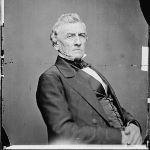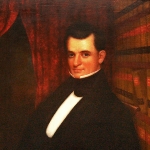Background
Andrew Barry Moore was born on March 7, 1807, in Spartanburg, South Carolina, United States. He was the son of Captain Charles and Jane Barry Moore. His father was a planter. In 1820 the family moved to Perry County, Alabama.

Andrew Barry Moore was born on March 7, 1807, in Spartanburg, South Carolina, United States. He was the son of Captain Charles and Jane Barry Moore. His father was a planter. In 1820 the family moved to Perry County, Alabama.
After moving to Alabama, Andrew Moore received a local primary school education.
Andrew Barry Moore was admitted to the bar in 1833. He served as justice of the peace for Perry County for eight years. Moore served in the Alabama House of Representatives from 1842 to 1845. Moore was elected speaker of the state House of Representatives in 1843, 1844, and 1845.
In 1851, Governor Henry W. Collier appointed him to a vacancy on the First Circuit Court, where Moore served until 1857 when he accepted the Democratic party's nomination for governor. He was elected without opposition and sworn into office on December 1, 1857.
Moore was considered a moderate on the slavery issue, and he won reelection on August 1, 1859. During Moore’s second term, a state convention was called to discuss the question of secession, and Alabama troops were ordered to seize the federal army forts within the state. The legislature appropriated $500,000 for defense, and $3 million was authorized to help offset the indebtedness of the war. Prohibited reelection by the 1819 Alabama Constitution, Moore left office on December 2, 1861. He was appointed special aide-de-camp to Governor John Gill Shorter, coordinating the acquisition and transportation of supplies to General Albert Sidney Johnston in northern Alabama. Moore was arrested by federal troops following the surrender of Lee at Appomattox. He was imprisoned with other Confederate leaders at Fort Pulaski in Savannah, Georgia. He was released from prison in August of 1865 because of declining health. Moore returned to Marion, Alabama, where he continued to practice law until his death.
During Moore's term, education and internal improvements received his prominent attention. The Medical College of Alabama was founded, and the Institute for the Deaf and Blind was established at Talladega.
Moore pushed for completion of the Alabama and Tennessee River Railroad, which would connect the north and south Alabama and provide transportation from the Tennessee River to the Alabama River.
At first, Andrew Moore Moore was a member of the Whig Party, but in 1839 he was elected to the Alabama House of Representatives as a Democrat.
Andrew Barry Moore supported a constitutional amendment providing for biennial sessions of the legislature. When the House was in session, Moore often called for another member to take the speaker's chair so he could mingle on the floor and participate in the debate. Moore was the last person to speak in the old statehouse in Tuscaloosa when he responded to a resolution of appreciation for his service as the speaker.
Moore was conservative, and although he supported states' rights, he was moderate on the issue of secession, whereas three of his opponents were extremists. Moore did not think the people of Alabama were ready for secession, and he believed the South's grievances did not yet justify disunion.
Moore supported the idea of counting only the white population to determine representation in the legislature, despite the preference in his Black Belt community for counting all people, including those who were enslaved, which would have increased the legislative power of those counties.
Moore believed that the irregularities and excessive loans being exposed by legislative investigations of the state bank were destroying the credibility of the state government.
Although sometimes rigid, Andrew Barry Moore was generally frank and cordial, a master at political party maneuvering, and possessed of a logical mind. One legislative contemporary described Moore as "a clever fellow but scary," who "has a good opinion of himself."
Physical Characteristics: Moore was six feet tall, well built, with sharp facial features.
Andrew Barry Moore married Mary Ann Goree in 1837. The couple had four children.
1777-1839
1783-1857
1799-1860
1811-1862
1823-1864
1824-1854
1808-1877
1837-1887
1843-1912

Moore worked closely with Governor Benjamin Fitzpatrick in the liquidation of the State Bank.

Appointed by Governor Henry W. Collier in 1851 to fill a vacancy on the circuit bench, Moore served in that capacity until 1857 when he accepted the Democratic Party's nomination for governor.
